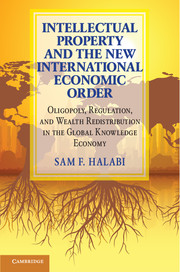Intellectual property and new International economic order
oligopoly, regulation, and wealth redistribution in the global knowledge economy
- ISBN: 9781316629161
- Editorial: Cambridge University Press
- Fecha de la edición: 2018
- Lugar de la edición: Cambridge. Reino Unido
- Encuadernación: Rústica
- Medidas: 23 cm
- Nº Pág.: 235
- Idiomas: Inglés

In economic sectors crucial to human welfare – agriculture, education, and medicine – a small number of firms control global markets, primarily by enforcing intellectual property (IP) rights incorporated into trade agreements made in the 1980s onward. Such rights include patents on seeds and medicines, copyrights for educational texts, and trademarks in consumer products. According to conventional wisdom, these agreements likewise ended hopes for a 'New International Economic Order,' under which wealth would be redistributed from rich countries to poor. Sam F. Halabi turns this conventional wisdom on its head by demonstrating that the New International Economic Order never faded, but rather was redirected by other treaties, formed outside the nominally economic sphere, that protected poor countries' interests in education, health, and nutrition and resulted in redistribution and regulation. This illuminating work should be read by anyone seeking a nuanced view of how IP is shaping the global knowledge economy.
Identifies a coherent and unified way of looking at seemingly disparate phenomena in international economic law
Explores a largely neglected dimension of the global wealth inequality debate
Addresses complex issues in international economics and international relations without resorting to technical language or jargon
Part I. Movements in Global Wealth Creation and Redistribution:
1. Economic development in low- and middle-income countries after decolonization
2. The expansion of international intellectual property protection
3. The merger between international intellectual property, investment, and trade law
Part II. Rethinking Wealth: Firms, Basic Human Needs, and Technology:
4. The pivot to basic human needs
5. The rise of supranational regulation of global firms
6. Access to medicines and vaccines
7. Food and agriculture
8. Consumer products
9. Educational and scientific printed works
Part III. International Intellectual Property Shelters: Redistributing Wealth and Regulating Oligopolies:
10. Medicines and vaccines
11. Biological and plant genetic resources for agriculture
12. Food and tobacco trademarks
13. Limiting copyright
Part IV. International Intellectual Property Shelters, Wealth Redistribution, and the Supranational Regulation of Global Firms:
14. International intellectual property shelters as mechanisms of redistribution
15. International intellectual property shelters and supranational regulation






